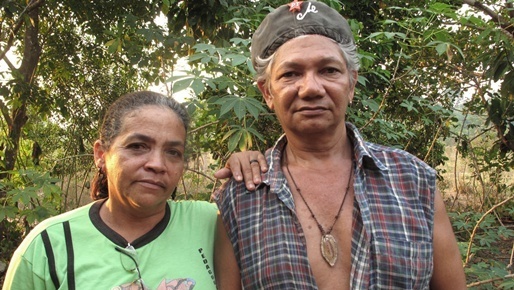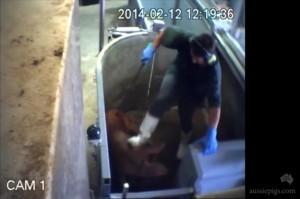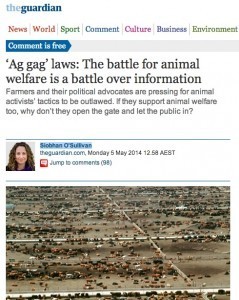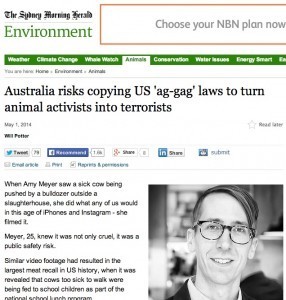Will Potter's Blog, page 11
June 4, 2014
Environmentalists Are Being Murdered More Often Than Ever Before — How Can We Stop It?
 Pictured here are José Cláudio Ribeiro da Silva and Maria do Espirito Santo, who were shot dead in 2011 for campaigning against illegal logging in the Amazon.
Pictured here are José Cláudio Ribeiro da Silva and Maria do Espirito Santo, who were shot dead in 2011 for campaigning against illegal logging in the Amazon.
Violence against environmentalists and indigenous groups defending their communities is dramatically on the rise, globally. I wrote about the trend in a recent article for Foreign Policy. This week I was a guest on KALW 91.7 in San Francisco, talking about this issue alongside Simeon Tegel, GlobalPost’s senior correspondent for South America.
May 8, 2014
“Whistleblowers should be praised, not prosecuted”
 Great writeup in Melbourne’s Weekly Times about my lecture tour on how “ag-gag” laws are coming to Australia.
Great writeup in Melbourne’s Weekly Times about my lecture tour on how “ag-gag” laws are coming to Australia.
Check out the full article here.
For further background on the issue, check out my recent oped in the Sydney Morning Herald, or come to one of the remaining stops on my Australian speaking tour, the Voiceless Animal Law Lecture Series!
May 7, 2014
ABC National Interview with Will Potter About What Australian Factory Farms are Trying to Hide
 I had the pleasure of being interviewed for the Law Report on Australia’s ABC National. I spoke with Damien Carrick about why ag-gag laws are beginning to appear in Australia, and why animal agriculture industries are trying to criminalize undercover investigators.
I had the pleasure of being interviewed for the Law Report on Australia’s ABC National. I spoke with Damien Carrick about why ag-gag laws are beginning to appear in Australia, and why animal agriculture industries are trying to criminalize undercover investigators.
You can listen to the radio interview here.
This comes on the heels of a recent investigation by AussiePigs.com that resulted in workers being fired after they were shown beating pigs.
For further background on the issue, check out my recent oped in the Sydney Morning Herald, or come to one of the remaining stops on my Australian speaking tour, the Voiceless Animal Law Lecture Series!
May 6, 2014
The Guardian on #AgGag: “The battle for animal welfare is a battle over information”
 There’s a wonderful column in The Guardian by Siobhan O’Sullivan about my Australian speaking tour against ag-gag laws.
There’s a wonderful column in The Guardian by Siobhan O’Sullivan about my Australian speaking tour against ag-gag laws.
Here’s an excerpt:
The popular slogan “if slaughterhouses had glass walls everyone would be vegetarian” is indicative of a view commonly held by animal advocates: that the biggest barrier to either improving animal welfare, or ending animal agriculture, is community ignorance about what really goes on in factory farms.
Intriguingly, farmers also often claim that the community is ignorant of their growing interest in animal welfare. If only ignorant city-slickers knew how concerned farmers are about their animals, they would not be vulnerable to manipulation by alarmist activists.
This month Will Potter, author of Green is the New Red, tours Australiato deal with these questions and contradictions: who controls the flow of information over agriculture? And how much should the urban elite be allowed to know about how animals are transformed into meat?
May 4, 2014
Australia Risks Copying U.S. #AgGag Laws to Turn Animal Activists into Terrorists
 My oped for the Sydney Morning Herald:
My oped for the Sydney Morning Herald:
When Amy Meyer saw a sick cow being pushed by a bulldozer outside a slaughterhouse, she did what any of us would in this age of iPhones and Instagram – she filmed it.
Meyer, 25, knew it was not only cruel, it was a public safety risk.
Similar video footage had resulted in the largest meat recall in US history, when it was revealed that cows too sick to walk were being fed to school children as part of the national school lunch program.
Instead of being praised for exposing this, Meyer was prosecuted.
Even though she stood on public property, she was charged with violating a new law in Utah that makes it illegal to photograph or videotape factory farms and slaughterhouses.
This was the first prosecution of its kind in the United States, but if the agriculture industry has its way, it won’t be the last.
“Ag-gag” laws have spread rapidly, and today half a dozen states have made it illegal to film factory farms.
Now, the agriculture industry wants to bring ag-gag to Australia.
This legislation is a direct response to undercover investigations by animal welfare groups, which have exposed horrific animal cruelty.
For example, in Idaho this year, an undercover investigator with Mercy For Animals exposed workers beating, kicking and sexually abusing cows at Bettencourt dairy.
In response, the dairy industry supported SB 1337, an ag-gag bill that prohibits any “audio or video recording” at a farm facility.
It punishes those who expose animal abuse more harshly than those who commit the violence. The bill passed into law just weeks ago.
Time and again, wherever undercover investigators expose cruelty, the industry fights back with attempts to keep consumers in the dark.
Why? Because when people see the reality of factory farming, they demand change. For instance, one of the nation’s largest egg producers testified during an ag-gag hearing that, after an undercover video was posted online, 50 businesses quickly called and stopped buying their eggs.
And, according to the first study of its kind, published in the Journal of Agricultural Economics, when animal welfare issues are reported in the news, consumers respond by eating less meat.
Factory farmers have been so desperate to silence their critics that they have even called investigators “terrorists”.
Senator David Hinkins, the sponsor of Utah’s ag-gag bill, said it was needed to stop “terrorists” such as “the vegetarian people” who “are trying to kill the animal industry”.
This terrorism rhetoric has worked its way to the top levels of government.
FBI files have revealed that the government has even considered prosecuting those who film animal cruelty as “terrorists”.
Now, this is spreading to Australia.
New South Wales Minister for Primary Industries Katrina Hodgkinson has said undercover investigators are “akin to terrorists”.
West Australian Liberal Senator Chris Back, and a number Australian federal politicians, have voiced support for US-style ag-gag laws.
Ag-gag is coming to Australia because animal advocates have been incredibly effective.
There is a long history of open rescues and undercover investigations here, and activists such as Patty Mark and Animal Liberation Victoria are known internationally for their pioneering work.
Meanwhile, national media exposes such as Four Corners’ “A Bloody Business” have outraged the public and created a national dialogue about live exports.
Australians have an opportunity that we lacked in the United States: you can stop these dangerous proposals before they ever become law.
If there is one thing I have learnt in my reporting on ag-gag laws, it is the power of an informed public to create change.
Amy Meyer stands as an example of that power. Just 24 hours after I broke the story of her prosecution, it had created such an uproar that prosecutors announced they were simply dropping all charges.
Meyer had never intended to face prosecution, or to lead by example, but she rose to the occasion. Australia has the power to do the same.
Will Potter is a journalist and TED Fellow based in Washington, DC. He is the author of Green Is the New Red. He is on a speaking tour for Voiceless, the animal protection institute, at Australian universities and law firms. For more information.
April 26, 2014
I’m Off to Australia for a Month-Long Tour Against #AgGag Laws
 I’m about to leave for Australia on a month-long speaking tour.
I’m about to leave for Australia on a month-long speaking tour.
A huge part of my work the last couple of years has been raising awareness about “ag-gag” laws, which make it illegal to take photographs or video of animal cruelty on factory farms and slaughterhouses.
Now, this legislation is spreading internationally.
In Australia, the agriculture industry is pointing to the United States, and saying “we want the ag-gag laws that they have.”
This lecture tour is organized to stop that, and prevent this dangerous legislation from spreading. It’s being organized by Voiceless, and I was invited to be the keynote speaker for the 2014 Animal Law Lecture Series.
It’s an incredible opportunity to stop this trend, now, before it takes root in another country. I’ll be sure to keep you all posted from the road!
And if you are in Australia, or know anyone who would be interested, it’s free to register. You can find your nearest location here: www.voiceless.org.au/lecture
It’s More Dangerous Than Ever to be an Environmentalist. Here’s Why.
 My new article for Foreign Policy.
My new article for Foreign Policy.
In the days before he was gunned down in the doorway of his home in the Brazilian Amazon, environmental activist and union leader Chico Mendes knew he was a marked man. He had heard that a meeting of ranchers had been called to plan his death; he had seen, in his truck’s rearview mirror, the pistoleiros who followed him. Mendes told friends in December 1988 that he wouldn’t live until Christmas. He was shot dead a few days later.
In the 25 years since Mendes’s death, he has become an environmental icon, heralded as the “Patron of the Brazilian Environment.” ”In leading this struggle to preserve the Amazon, Chico Mendes had made a lot of trouble for a lot of powerful people,” Andrew Revkin wrote in The Burning Season, his book about Mendes. ”He was to the ranchers of the Amazon what César Chavez was to the citrus kings of California.”
But Mendes wanted something else. A month before his death he wrote, “I’d at least like my murder to serve to put an end to the impunity of the gunmen who have already killed people like me.”
That hasn’t happened. It is still incredibly dangerous to be an environmental activist in Brazil. And new research shows that violence against environmentalists has now escalated to an all-time high — not just in Brazil, but globally.
Between 2002 and 2013, at least 908 people were killed because of their environmental advocacy, according to “Deadly Environment,” a new report from the investigative nonprofit Global Witness. That’s an average of at least one environmentalist murdered every week, and in the last four years, the rate of the murders has doubled. In 2012, the deadliest year on record, 147 deaths were recorded, three times more than a decade earlier. “There were almost certainly more cases,” the report says, “but the nature of the problem makes information hard to find, and even harder to verify.”
In places like Myanmar, China, and parts of Central Asia, human rights monitoring is simply prohibited. In African countries like Nigeria, the Democratic Republic of the Congo, and Zimbabwe, where clashes over resources have escalated, researchers say it is impossible to track the violence without in-depth field investigations, because governments haven’t documented the killings. The most vulnerable activists are those in indigenous communities in remote, rural areas who are facing off against much more powerful business interests in industries like mining and logging. Much of the world never hears about their struggles, or their deaths. In other words, where environmental advocates are most at risk they are least visible.
Despite these difficulties in collecting data, some patterns are clear. More than two-thirds of environmental murders globally were related to land conflicts. The most dangerous of these conflicts involve logging in the Amazon. But even after forested areas are harvested, the danger persists — the land is opened up to other industries like cattle ranching, and violence continues. Local communities that are not consulted about these business deals often don’t know what’s happening until they see the bulldozers. The law doesn’t recognize the land rights of indigenous people, and even if it did, these people do not have the legal resources to assert their rights. Those who remain and fight are threatened, not only by corporate thugs but by state security forces collaborating with industry.
Brazil, where land ownership is among the most concentrated and unequal in the world, accounts for about half of all recorded killings of environmental advocates, according to Global Witness. Although increased monitoring and reporting of violence might partially explain these high numbers, Brazil remains overwhelmingly more dangerous for environmentalists than other countries. Only partial data is available for 2013, but it shows that twice as many environmentalists were killed in Brazil than in any other country. As Brazilian political ecologist Felipe Milanez has said, “Violence is the instrument of local capitalism.”
In one high-profile case, Jose Claudio Ribeiro da Silva and his wife, Maria do Espirito Santo, were shot in a forest reserve by gunmen on a motorbike. The couple had worked producing nuts and oils for 24 years in the area, and when they became outspoken against illegal logging, they began receiving death threats. Both were members of the NGO founded by Mendes to preserve Amazon forests. And, like Mendes, da Silva predicted his own death.
The two men who pulled the trigger were convicted in 2013 — a rare victory in these kinds of cases — but the landowner accused of hiring the assassins walked free. This is typical: Only 34 people worldwide are currently facing charges for violence against environmentalists, and only 10 killers were convicted between 2002 and 2013.
The architects of environmentalists’ murders often have connections to powerful industries and politicians. “A fundamental challenge is confronting the widespread impunity enjoyed by political and economic elites who benefit directly from silencing environmental defenders,” Andrew Miller, advocacy director of Amazon Watch, said in an email. “The material authors of killing — the actual gunmen — are rarely caught and sanctioned, while the intellectual authors virtually never are.”
In the Philippines, which ranks third after Brazil and Honduras in terms of danger to environmentalists, there has been evidence of direct connections among industry, politicians, and gunmen. In 52 killings around the world, the culprits have been recognized as military or law enforcement personnel, though their identities remain unknown.
The lack of prosecutions has sent a clear message that environmentalists can be killed with impunity, according to Paulo Adario, a Greenpeace activist who campaigned against Brazil’s illegal mahogany trade. Brazil’s former president, Fernando Henrique Cardoso, gave him full-time bodyguard protection after he began receiving death threats in the early 2000s. “If you don’t punish crimes, you give a good signal for the future crimes,” Adario told Global Witness investigators. “If nobody was punished, and the last government gave in to pressure for an amnesty for everybody, why are they not going to do the same thing in five years from now?”
***
The threat facing environmentalists is direr, however, than even “Deadly Environment” outlines. The research is confined to 74 countries in Africa, Asia, and Central and South America, and it only includes murders. Nonlethal violence and intimidation, which is much more pervasive, are left out.
Jenny Weber is a longtime activist in Tasmania, where loggers have shot at and beaten environmentalists, blown up cars, and threatened lives. When two activists locked themselves in a car to blockade a logging road during a 2008 protest, a logger smashed out the car windows, dragged them out, and kicked them on the ground. The loggers were convicted of assault and sentenced only to community service.
“We have had firebombs thrown at blockade camps and vandalism of property,” Weber said in an email. “Though in comparison to fellow earth advocates across the globe I find that my experiences of violence over the past 15 years is not comparable.” Indigenous communities are facing such extreme violence, Weber said, that she is reluctant to draw attention away from them.
There is also a well-documented history of violence against environmentalists in Western countries, which isn’t included in the Global Witness report. In the United States, for example, a young environmentalist named David “Gypsy” Chain was killed in 1998 when a logger felled an old-growth tree in his direction. Moments before, the logger was recorded on video saying that if protesters didn’t move, he would “make sure I got a tree coming this way.” Chain was crushed and killed, and the local district attorney refused to press charges against the logger.
In England in 1995, Jill Phipps was protesting the export of live calves through Coventry Airport. She and about 30 other protesters were trying to stop the trucks by sitting in the road and chaining themselves together. Phipps was crushed beneath a truck and died.
Today in the United States and England, the mercenaries often hired to silence environmental activists are not assassins — they’re lawyers and lobbyists. Companies like TransCanada are briefing police on how to prosecute nonviolent pipeline protesters as terrorists. In Oklahoma, environmental activists are facing 10 years in prison because they unfurled a banner in a corporate headquarters and some glitter fell off the banner to the floor; police say they had no idea the glitter wasn’t a chemical weapon, so that amounted to a “terrorism hoax.” And now, multiple states are passing laws that make it illegal for environmentalists and animal welfare activists to videotape factory farms.
These legal and legislative tactics have been spreading. Could the violence that countries like Brazil have witnessed for years spread too? Perhaps the most troubling conclusion reached by researchers is that this is not only possible, but imminent. Since 2008, there have been a series of global food crises, and in that same period, murders of environmentalists have doubled. And signs for the future are bleak: A study by 22 prominent ecologists published in Nature in 2012 forewarns that the planet is nearing a point of dangerous, sweeping environmental changes — alongside massive population growth.
“These killings are increasing because competition for resources is intensifying in a global economy built around soaring consumption and growth,” the “Deadly Environment” report notes, “even as hundreds of millions go without enough.”
Jane Goodall, Woody Harrelson, and Amy Goodman Speak Up for “Food Revolution”
 If you’re interested in sustainability, animal rights, your health, and food justice, you need to check out the Food Revolution Summit. It’s a free series with an impressive roster of speakers including Jane Goodall, Woody Harrelson, Amy Goodman and many others. And it’s hosted by John Robbins (author of Diet for A New America) and his son, Ocean Robbins.
If you’re interested in sustainability, animal rights, your health, and food justice, you need to check out the Food Revolution Summit. It’s a free series with an impressive roster of speakers including Jane Goodall, Woody Harrelson, Amy Goodman and many others. And it’s hosted by John Robbins (author of Diet for A New America) and his son, Ocean Robbins.
I was honored to be included in this lineup last year, and it was a great experience.
I hope you’ll check out these lectures online!
April 21, 2014
I’ll Be Speaking in New York on Tuesday for Earth Day
 I’ll be speaking at Rensselaer on Tuesday, April 22nd, as part of the university’s Earth Day events.
I’ll be speaking at Rensselaer on Tuesday, April 22nd, as part of the university’s Earth Day events.
Here are the details:
WHEN:
April 22, 2014 @ 2:00 pm – 3:30 pm
WHERE:
Center for Biotechnology and Interdisciplinary Studies
Rensselaer Polytechnic Institute,Troy,NY 12180
USA
Hope to see you there!
April 20, 2014
Animal Rights Activist Sentenced to 30 Months in Jail for Having Bolt Cutter in His Prius
 My latest article for VICE:
My latest article for VICE:
An animal rights activist with a long history of activism—and an equally long rap sheet—was sentenced to 30 months in jail for having bolt cutters in the back of his Prius.
Kevin Olliff and Tyler Lang were driving through rural Illinois on August 15, 2013, at about 1 AM when they were pulled over by police. The cops say they stopped them because the brand-new green Prius had only temporary dealer plates. But rather than let them off with a warning, police asked to search the car.
Olliff and Lang refused to consent to the search and quickly realized that this wouldn’t be a normal traffic stop. After police separated them into two squad cars, Lang heard one officer on the police radio say of Olliff, “He’s on the terrorist watch list.”
Police brought out drug-sniffing dogs, and not surprisingly, they say the dogs smelled something (Lang says “the hardest drug in the car was caffeine”). When police searched the car, they found, among other items, bolt cutters and wire cutters. The two were charged with “possession of burglary tools,” a felony.
The items in Olliff’s car certainly sound sketchy when police list them out: bolt cutters and wire cutters; duffel bags full of sweatpants, sweatshirts, gloves, and ski masks; spray paint; concrete stain; laptop computers; bear spray; head lamps; latex gloves; walkie-talkies; rags; bleach. Most of us can have those things in our cars and not worry about being charged with a felony. According to the FBI, Olliff and Lang are not most people, though: They’re animal rights activists.
FBI agents made their presence known at the bail hearing, telling prosecutors that there have been unsolved fur-farm raids in the region and other farms may be targeted. They specifically mentioned the Aeschleman fox farm in Roanoke, one of the largest in the country and the site of the historic PETA investigation in the 1990s, which revealed sick and neglected animals pacing in their cages and being anally electrocuted.
Bail was set at $100,000 for Lang and $200,000 for Olliff, or more than ten times the typical amount.
They were not charged with any fur-farm raid, or any other illegal activity. But the FBI and prosecutors hung the threat of additional charges over their heads, and they eventually accepted plea agreements. Lang, who accepted a plea deal for time served and was released in November, will only say that the items in the car were an “inconvenient circumstance,” and that they had no choice but to take a deal. Olliff was sentenced to 30 months in jail and is currently imprisoned in Vandalia, Illinois.
Lang says that although he received a much lighter sentence than Olliff, the FBI is clearly trying to send him a message. When he flew home from jail, he saw that he had four S’s on his boarding pass; he was singled out for additional security checks. Now, every time he travels he is searched by TSA and Homeland Security. Meanwhile, both his mother and step-mother have been visited by the FBI. Both refused to talk to the agents and have been supportive throughout the ordeal.
“The day after I got home [from jail], I went to a protest,” Lang says. “It was liberating for me, because I really did not want to let this make me afraid.”
Olliff continues to deny his involvement in the Animal Liberation Front, but is outspoken in his support for illegal direct action. In a statement from prison, he told supporters: “Get out into the streets. Better yet, get out into the countryside. Do what you know in your heart is right. You won’t regret it.”
His book list is like a giant middle finger to police, with Wireless Reconnaissance in Penetration Testing alongside Dressing the Man: Mastering the Art of Permanent Fashion. He also asked for a subscription to VICE.
His father, Stacey Olliff, says he’s frustrated with his son’s vocal support of direct action, and the fact that he has been in and out of jail for protesting and shoplifting throughout his 20s. But police are “taking things that otherwise wouldn’t be illegal and criminalizing them,” he says, “in order to turn the screws and send a message.”
“It’s frustrating to see this kind of repressive response from authorities,” he says. “But their goal is shutting down this activity, and when they happen to catch somebody they know, they want to make an example of them.”



